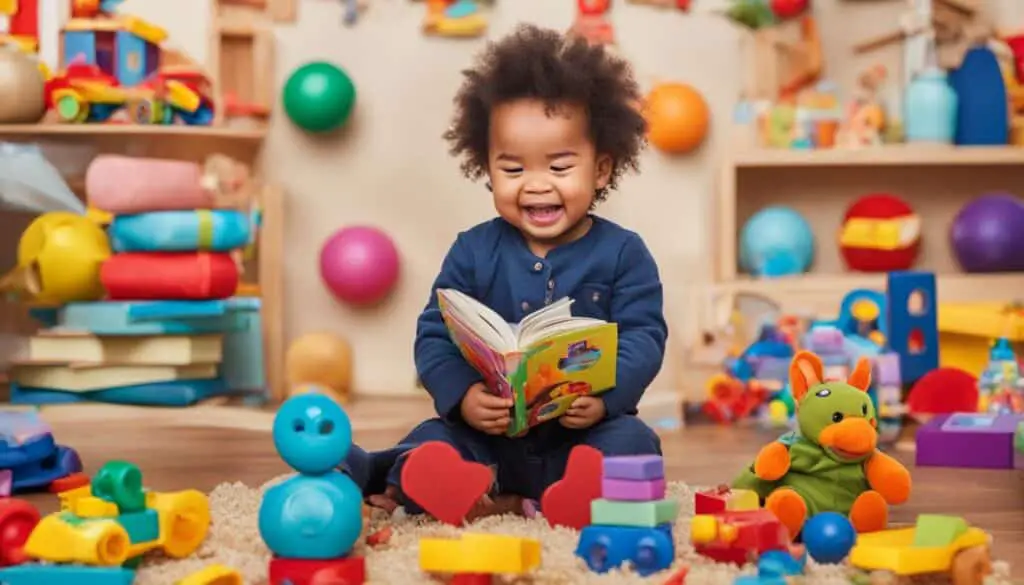
positive parenting techniques
I believe that implementing positive parenting techniques is essential for effectively managing toddlers and fostering their growth and harmony. As a parent, I understand the challenges that come with parenting a toddler, and I have come to realize the importance of using strategies that promote positive behavior and nurture their development.
Toddlers are at a stage where they are discovering the world around them and developing their sense of self. It is crucial for parents to create an environment that encourages their growth and helps them navigate their emotions and behaviors in a positive way.
In this article, I will delve into the importance of positive parenting techniques and how they can positively impact a toddler’s behavior and overall development. I will explore effective discipline strategies, communication and emotional expression, and building a strong parent-child bond.
Key Takeaways:
- Positive parenting techniques are crucial for managing toddlers.
- Implementing effective discipline strategies can help shape toddler behavior.
- Encouraging communication and emotional expression is key to fostering positive behavior.
- Building a strong parent-child bond promotes overall positive behavior.
- Positive parenting techniques create a nurturing environment for toddlers’ growth and harmony.
Understanding the Importance of Positive Parenting Techniques
Positive parenting techniques are essential for shaping a toddler’s behavior and overall development. By employing strategies that focus on positivity, parents can effectively manage their child’s behavior and promote a healthy and harmonious environment.
“Positive parenting techniques have a profound impact on a child’s emotional well-being and self-esteem.”
– Dr. Jane Thompson, Child Psychologist
Positive reinforcement plays a key role in encouraging desired behaviors in toddlers. By praising and rewarding their positive actions, parents can reinforce those behaviors and motivate their child to continue exhibiting positive conduct.
Setting clear boundaries is another important aspect of positive parenting. By establishing consistent rules and expectations, parents provide their toddler with a sense of structure and security. This promotes a better understanding of acceptable behavior and helps prevent confusion or frustration.
In addition, creating a nurturing environment is crucial for a toddler’s growth and development. This involves providing love, support, and attention to their emotional and physical needs. When toddlers feel safe, loved, and understood, they are more likely to exhibit positive behavior and develop a strong sense of self.
Benefits of Positive Parenting Techniques
- Promotes strong parent-child relationships.
- Enables effective communication and problem-solving skills.
- Enhances emotional intelligence and empathy.
- Reduces the likelihood of challenging behaviors.
- Fosters a positive self-image and boosts self-confidence.
To further understand the importance of positive parenting techniques, let’s take a closer look at the research findings below:
| Research Findings | Benefits |
|---|---|
| Study by Dr. Sarah Adams | Children raised in a positive parenting environment are more likely to develop stronger social skills and emotional intelligence compared to those subjected to harsh discipline. |
| Survey conducted by Parenting Magazine | 86% of parents who practice positive parenting techniques reported a healthier parent-child relationship and reduced behavioral problems in their children. |
By understanding the importance of positive parenting techniques and implementing them consistently, parents can create a nurturing and supportive environment that fosters their toddler’s healthy behavior and overall development.
Implementing Effective Discipline Strategies
Implementing effective discipline strategies is essential for managing toddler behavior and promoting positive development. By utilizing positive discipline techniques, parents can establish clear boundaries and guide their toddlers towards appropriate behavior.
One of the effective techniques is redirection, which involves redirecting a toddler’s attention from an undesired behavior to a more suitable activity or object. This helps to distract them and teach them alternative behaviors.
Time-outs can also be helpful in teaching toddlers the consequences of their actions. When a toddler engages in inappropriate behavior, a short time-out in a designated area can give them an opportunity to calm down and reflect on their actions.
“The use of consistent limits is crucial in toddler discipline. By setting clear expectations and consistently enforcing them, parents can help their toddlers understand what behaviors are acceptable and what are not.” – Dr. Rebecca Johnson, Child Psychologist
Consistency is key in toddler discipline. When parents enforce consistent limits, toddlers are more likely to understand and respect the boundaries set for them. This consistency creates a sense of structure, security, and predictability, which is essential for their development.
Comparison of Discipline Techniques
| Technique | Advantages | Disadvantages |
|---|---|---|
| Redirection |
|
|
| Time-outs |
|
|
| Consistent limits |
|
|
Encouraging Communication and Emotional Expression
Encouraging effective communication and emotional expression in toddlers is crucial for fostering positive behavior and supporting their overall development. By creating a nurturing environment that promotes open dialogue and emotional understanding, parents can establish a strong foundation for healthy communication skills and emotional management.
Active listening is an essential aspect of communication with toddlers. It involves fully engaging with your child, giving them your undivided attention, and actively seeking to understand their thoughts and feelings. When your toddler feels heard and validated, they are more likely to communicate openly and develop trust in their ability to express themselves.
Using age-appropriate language is another fundamental element of effective communication with toddlers. Adjusting your vocabulary and communication style to match their developmental stage allows them to comprehend and respond appropriately. Simple and concise sentences, accompanied by gestures and facial expressions, can enhance their understanding and encourage active participation in conversations.
In addition to verbal communication, providing a safe space for emotional expression is vital for toddlers to manage their emotions. Emotions play a significant role in a child’s behavior and well-being, and allowing them to express their feelings without judgment or criticism is key. By acknowledging and validating their emotions, parents can help toddlers develop healthy coping mechanisms and emotional intelligence.
Children must be able to express their feelings, as that is an essential aspect of their self-discovery and emotional growth. Encouraging emotional expression in a safe and supportive environment enables toddlers to develop resilience and a deeper understanding of themselves and others.
Fostering communication and emotional expression in toddlers not only promotes positive behavior but also strengthens the parent-child bond. It enables parents to better understand their child’s needs, desires, and struggles, creating a more harmonious and fulfilling relationship.
Quick Tips to Encourage Communication and Emotional Expression:
- Set aside dedicated one-on-one time with your toddler for uninterrupted conversations.
- Use age-appropriate books, songs, and games to encourage language development.
- Model healthy emotional expression by expressing your feelings and discussing them openly.
- Offer choices and encourage decision-making to empower your toddler and foster their autonomy.
- Validate your child’s emotions by acknowledging and empathizing with their feelings.

“Communication is the key to understanding. Encouraging toddlers to express themselves equips them with lifelong skills for effective communication and emotional well-being.”
Building a Strong Parent-Child Bond
Building a strong parent-child bond is essential for positive parenting. When parents develop a deep connection with their child, it creates a nurturing foundation for their overall development and well-being. Receiving love, attention, and support from their parents helps children feel secure and encourages them to thrive.
Spending quality time together is a valuable way to strengthen the parent-child bond. Engaging in activities that promote bonding and create lasting memories can have a profound impact on the relationship. Whether it’s playing games, reading books, or going on adventures, these shared experiences strengthen the emotional connection and build trust.
“A strong parent-child bond is like a secure bubble that shields children from the challenges of the outside world. It gives them the confidence and security they need to explore, learn, and grow.”
Showing unconditional love and support is another vital aspect of building a strong parent-child bond. When children feel loved and accepted for who they are, it creates a safe space for them to express themselves and develop a healthy sense of self-worth. People may come and go throughout our lives, but the unwavering love of a parent is a constant source of reassurance.
By prioritizing the parent-child bond, parents can foster a positive attachment with their toddler. This attachment forms the foundation for healthy relationships in the future and contributes to the child’s overall well-being.

Activities to Strengthen the Parent-Child Bond
| Activity | Description |
|---|---|
| 1. Family meals | Regularly eating meals together promotes communication and connection. |
| 2. Storytelling | Reading stories together introduces children to new worlds and sparks imagination. |
| 3. Outdoor adventures | Exploring nature and engaging in physical activities together encourages bonding. |
| 4. Chores and projects | Working on household chores or projects as a team fosters collaboration and a sense of responsibility. |
| 5. Unstructured playtime | Allowing for unstructured playtime encourages creativity and enables parents to join in on the fun. |
Conclusion
In conclusion, positive parenting techniques are vital for effectively managing toddler behavior and nurturing their growth and harmony. It is crucial for parents to understand the importance of positive parenting and implement strategies that create a positive and nurturing environment for their toddlers.
By implementing effective discipline strategies, parents can establish clear boundaries and teach their toddlers appropriate behavior. Techniques such as redirection, time-outs, and setting consistent limits can help toddlers understand boundaries and learn self-control.
Encouraging communication and emotional expression is another essential aspect of positive parenting. Actively listening to toddlers, using age-appropriate language, and providing a safe space for emotional expression can foster effective communication skills and help toddlers manage their emotions in a healthy way.
Building a strong parent-child bond is the cornerstone of positive parenting. Spending quality time together, engaging in bonding activities, and showing unconditional love and support can strengthen the parent-child relationship, enhance trust, and contribute to overall positive behavior.
FAQ
What are positive parenting techniques?
Positive parenting techniques are strategies and methods that promote positive behavior and nurture the overall development of a toddler. These techniques involve using positive reinforcement, setting clear boundaries, and creating a nurturing environment.
Why are positive parenting techniques important for managing toddlers?
Positive parenting techniques are important for managing toddlers because they help shape their behavior and promote healthy growth. By using these techniques, parents can effectively manage their toddler’s behavior and create a positive and nurturing environment.
What are effective discipline strategies for toddlers?
Effective discipline strategies for toddlers include positive discipline techniques such as redirection, time-outs, and setting consistent limits. These strategies help toddlers understand boundaries and learn appropriate behavior.
How can communication and emotional expression be encouraged in toddlers?
Communication and emotional expression can be encouraged in toddlers by actively listening to them, using age-appropriate language, and providing a safe space for them to express their emotions. This helps toddlers develop effective communication skills and better manage their emotions.
How can a strong parent-child bond be built?
A strong parent-child bond can be built by spending quality time together, engaging in activities that promote bonding, and showing unconditional love and support. This strengthens the parent-child relationship and contributes to overall positive behavior in toddlers.